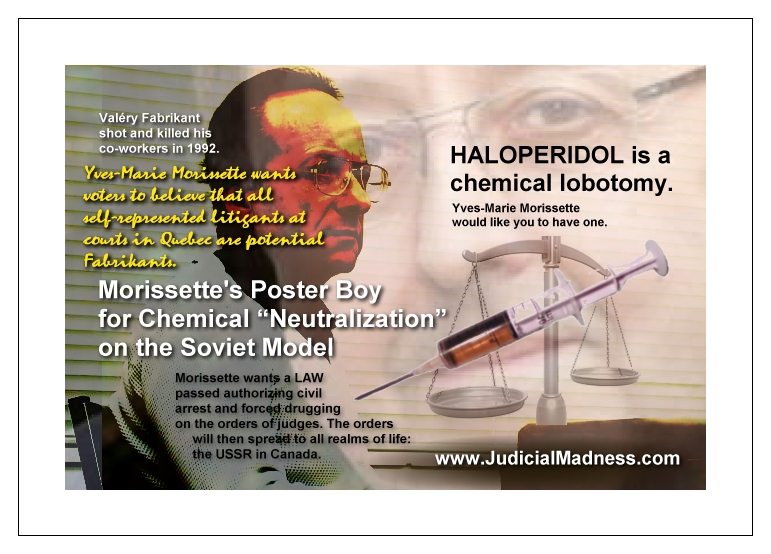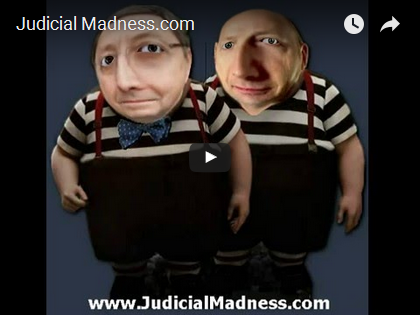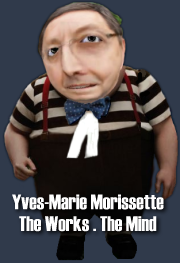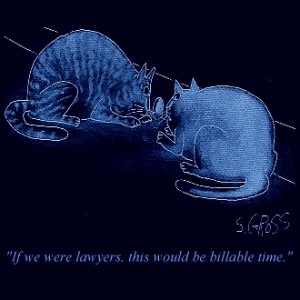Querulousness by Jacques Gagnon M.D., CSPQ, FRCP, Psychiatrist

DOSSIER: EXTREME BEHAVIOR
|
1. |
Extreme Behavior |
2. |
Extreme Behavior – “Querulousness” by Dr. Jacques Gagnon |
3. |
Extreme Behavior – “Judicial Control of Querulous Litigants” by Mr. Justice [sic] Yves-Marie Morissette |
4. |
Extreme Behavior – “A Portrait of Querulous Behavior” by Le Spécialiste “with the kind collaboration of Mr. Justice Y.-M. Morissette” |
| 5. |
Elsevier – “Evaluation de la dangerosité du malade mental psychotique” / “Dangerousness evaluation of psychotic patient” by F. Millaud and J.-L. Dubreucq, Psychiatrists. (Available online in 2005) [This is a French article with a bilingual abstract. Judicial Madness has provided an exclusive English translation of the article.] |
2.
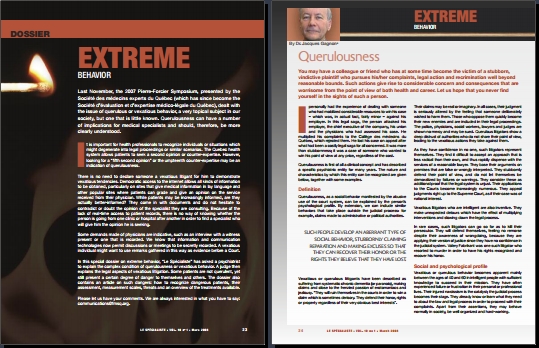
Jacques Gagnon, M.D., CSPQ, FRCP, Psychiatrist, C.H. Maisonneuve-Rosemont, Assistant Clinical Professor, Université de Montréal

Jacques Gagnon, M.D., CSPQ, FRCP, Psychiatrist, C.H. Maisonneuve-Rosemont, Assistant Clinical Professor, Université de Montréal
EXTREME BEHAVIOR
Querulousness by Dr. Jacques Gagnon (2008)
Source: Le Spécialiste, The FMSQ Magazine Vol. 10 no. 1 – March 2008, EXTREME BEHAVIOR, Querulousness and Vexatious Behaviors, Dangerous Behavior (Cover). Download the English edition of the magazine here: Vol 10 no 1 Le Spécialiste, The FMSQ Magazine Vol. 10 no. 1 – March 2008. Special issue featuring a “Dossier” on EXTREME BEHAVIOR
Download the French edition of the same magazine here:
Foreword:
Dr. Jacques Gagnon’s is a new name that has come to light in connection with Yves-Marie Morissette’s campaign to blacklist self-represented litigants. Gagnon is the putative author of the article below, which he obviously cribbed out of the articles of Yves-Marie Morissette, and Morissette’s interviews.
I found a CV online in French for Gagnon, and have provided an exclusive English translation for Judicial Madness:
Detailed CV of Dr. Jacques Gagnon.
An OCR of the original French CV is here:
Curriculum vitae détaillé du Dr Jacques Gagnon (2011).

Le Spécialiste DOSSIER: Extreme Behavior

Dr. Jacques Gagnon
Querulousness
You may have a colleague or friend who has at some time become the victim of a stubborn, vindictive plaintiff who pursues his/her complaints, legal action and recrimination well beyond reasonable bounds. Such actions give rise to considerable concern and consequences that are worrisome from the point of view of both health and career. Let us hope that you never find yourself in the sights of such a person.
I personally had the experience of dealing with someone who had mobilized considerable resources to win his case - which was, in actual fact, fairly minor - against his employer. In this legal saga, the person attacked his employer, the chief executive of the company, his union and the physicians who had assessed his case. He multiplied his complaints to the Collège des médecins du Québec, which rejected them. He lost his case on appeal after what had been a costly legal saga for all concerned. It was more than stubbornness; it was a case of someone who wanted to win his point of view at any price, regardless of the cost.
Querulousness is first of all a clinical concept and has described a specific psychiatric entity for many years. The nature and characteristics by which this entity can be recognized are given below, together with some examples.
Definition
Querulousness, as a social behavior manifested by the abusive use of the court system, can be explained by the person’s psychological profile. By extension, we can include similar behaviors that take place outside the judicial process: for example, claims made to administrative or political authorities.* [Emphasis added. JMad.]
SUCH PEOPLE DEVELOP AN ABERRANT TYPE OF SOCIAL BEHAVIOR, STUBBORNLY CLAIMING REPARATION AND MAKING EXCUSES SO THAT THEY CAN RECOVER THEIR HONOR OR THE RIGHTS THEY BELIEVE THAT THEY HAVE LOST
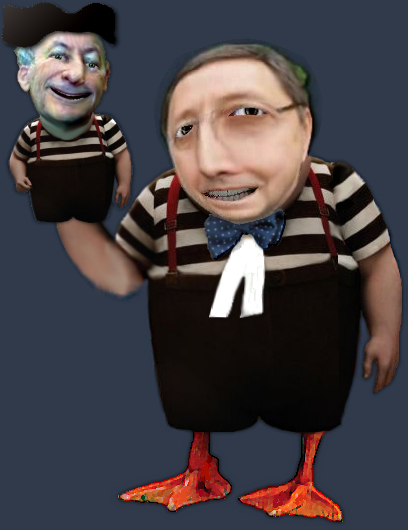
Quebec Court of Appeal Judge Yves-Marie Morissette with his
“Dr. Jacques Sock Puppet”
“Repeat after me…”
Vexatious or querulous litigants have been described as suffering from systematic chronic dementia (or paranoia), making claims and close to the frenzied passion of erotomaniacs and jealousy. “They will ruin themselves in the courts in order to win a claim which is sometimes derisory. They defend their honor, rights or property regardless of their very obvious best interests”.
Their claims may be real or imaginary. In all cases, their judgment is seriously altered by the feeling that someone deliberately wished to harm them. Those who oppose them quickly become their new enemies and are included in their legal proceedings. The police, physicians, social workers, lawyers and judges are shown no mercy and may be sued. Querulous litigators show a deep distrust of authorities who do not share their point of view, leading to the vexatious actions they take against them.
As they have confidence in no one, such litigators represent themselves. They find it difficult to accept an approach that is less radical than their own, and thus rapidly dispense with the services of a reasonable lawyer. They base their arguments on premises that are false or wrongly interpreted. They stubbornly defend their point of view, and do not let themselves be demoralized by failures or warnings. They consider these as additional proof that the legal system is unjust. Their applications to the Courts become increasingly numerous. They appeal judgments right up to the Supreme Court, as if their case was of national interest.
Vexatious litigators who are intelligent are also inventive. They make unexpected detours which have the effect of multiplying interventions and slowing down the legal process.
In rare cases, such litigators can go so far as to kill their persecutor. They will defend themselves, feeling no remorse despite their awareness of wrongdoing, because they are applying their version of justice since they have no confidence in the judicial system. Valery Fabrikant was one such litigator who resorted to murder in order to have his rights recognized and recover his honor.
Social and psychological profile
Vexatious or querulous behavior becomes apparent mainly between the ages of 40 and 60 in intelligent people with sufficient knowledge to succeed in their mission. They have often experienced failure or frustration in their personal or professional lives. Their injured narcissism is the catalyst; the judicial process becomes their stage. They already know or learn what they need to about the law and legal process in order to proceed with their complaints. Apart from their assertions, they may behave normally in society, be well organized and hard-working.
THEIR CLAIMS MAY BE REAL OR IMAGINARY. IN ALL CASES, THEIR JUDGMENT IS SERIOUSLY ALTERED BY THE FEELING THAT SOMEONE DELIBERATELY WISHED TO HARM THEM.
Those most severely affected demonstrate a structured, sectorial manic thought process with a persecution complex. Their paranoid thoughts originate in the fundamental, implacable premise that they are the victim of persecution, theft or some other scheme to discredit them. This unshakable conviction, despite a lack of any proof, alters their judgment which appears to us to be inchoate, categorical and without any sign of nuance. They do not experience hallucinations or cognitive impairment.
Others show no manic thought process, but present a pathological personality profile. This would be paranoid in nature: cold, rigid and distrustful, with mental projection sufficiently anchored in reality that they cannot be considered manic.
There is also the narcissistic profile: grandiose, haughty, distrustful, seeking admiration and success.
Narcissistic or paranoid characteristics are virtually necessary to explain their excessively demanding behavior. As people are not made to fit our nosological [sic] entities, a mixture of borderline, histrionic or sociopathic personality traits can be observed.
An exemple [sic]
Valery Fabrikant, born in 1940, is married and the father of 2 children. He was an Associate Professor of Mechanical Engineering at Concordia University. His application to become a titular professor had previously failed.
In 1992, he sued two colleagues requiring that they withdraw their names from articles he had published. He accused Mr. Justice Gold, the University’s Chancellor, of appointing corrupt judges to hear his case. On August 24, 1992, the eve of his contempt of court hearing, he shot four professors who were his colleagues and wounded a secretary.
The long and difficult trial was stopped by the judge after five months of delaying tactics and abusive language. Valery Fabrikant was imprisoned for life. The Court rejected the concept of psychosis, which would allow a verdict of not guilty by reason of mental disorder. [Emphasis added. JMad.]
The Court declared him to be a vexatious litigator in 2000, after he presented multiple suits, appeals and frivolous proceedings.
On November 5, 2007, Valery Fabrikant again appeared before the Court to resume the legal action begun in 1992, which was interrupted by his killing spree. He still demanded reparation from the professors he had killed. He also wanted to sue the judge of a previous trial and obtain his apologies for having convicted him. Mr. Justice Gilles Hébert recused himself on November 13, after just a few days, because he could no longer endure Fabrikant’s insults and recriminations. His replacement, Madam Justice Nicole Morneau, took the case and, after one week, terminated the trial on the basis that it was frivolous and without foundation.*
Conclusion
Vexatious or querulous litigants suffer from a psychiatric disorder that changes their social behavior. The cost is high for everyone: their family, society and the functioning of the Courts. Judicial procedures can limit the damage by declaring such people to be vexatious (querulous) complainants, which means that they must obtain prior permission from a judge before bringing a case to court.
Psychiatry is poorly equipped to help such people because of their projective defense. They do not feel ill; they believe they are victims of the system. They are alert to any contradiction likely to demonstrate their basic premise – i.e. even therapists can form part of the system persecuting them.
In theory, a therapeutic approach should concentrate on the narcissistic injury that triggered the storm, focus on the person, acknowledge behavior adaptation, and avoid criticizing vexatious behavior. The care team must have an unshakable cohesion and a high degree of transparency. [Emphasis added, JMad.]
Neuroleptics, if the patient agrees to take them, seldom cure systematic dementia but, in some cases, a reduction in tension and behavioral lapses can be hoped for. [Emphasis added. JMad.]
Close cooperation between psychiatry and the justice system must be ensured in order to respond to the highly predictable manoeuvres of people who bring their internal psychodrama before the forum of a court of justice.
_________
Admin’s Notes (Judicial Madness)
* Dr. Gagnon is writing in 2008. However, Fabrikant appealed the judgement rendered on the 26th of November 2007 by Quebec Superior Court (Judge Nicole Morneau) to the Quebec Court of Appeal, and won on 16th February 2010. The lesson being that just because you dislike someone doesn’t mean you have the right, even as a judge, to circumvent the legal system in order to cause this person prejudice. However, it looks to me as though the restoration of the Fabrikant case was largely to create an opportunity to declare him crazy under the new Articles 54.1 CCP et seq; and this, in spite of the the fact that his murder defense – that he was crazy – had been thrown out at his criminal trial.
Thus, in Fabrikant c. Swamy, 2010 QCCA 330 (CanLII), on 16th February 2010, Quebec Court of Appeal judge François Pelletier, writing for himself, André Brossard J.C.A. and Marie-France Bich J.C.A., invalidated Judge Morneau’s ruling of 26th November 2007 and reinstated Fabrikant’s case begun in 1992, by citing Article 23 of the Quebec Charter of Rights and Freedoms (Impartial hearing before independent tribunal). Wrote Judge Pelletier:
23. Every person has a right to a full and equal, public and fair hearing by an independent and impartial tribunal, for the determination of his rights and obligations or of the merits of any charge brought against him.
Judge Pelletier also said:
[31] [Translation:] Also, whatever the reasons might have been which brought the judge to proceed as she had done, it is obvious that the method used has had for effect to deprive the appellant of a fundamental right, that being said with the greatest consideration.
[32] [Translation:] Can the particular circumstances of the case under review justify this deprivation? With all deference, I am of the opinion that no.
Accordingly, Judge Pelletier returned the original case to be pursued at first instance, placed the parties back into the positions in which they had been prior to Morneau’s precipitous judgment. However, Pelletier J. simultaneously recommended the use of the new Article 54.1 et seq of the 2009 Code of Civil Procedure; [article 54.5 falsely purporting to authorize existing judicial rules to declare people "quarrelsome" (querulous)], in the event of further disturbances by Mr. Fabrikant of the kind which had vexed Judge Morneau to the point of unlawfully throwing out Fabrikant’s case.
At this time, I have no idea how the restored case was actually concluded once it was resumed. I suspect he did not win. However, obviously, Mr. Fabrikant does not lose all the time, and therefore his actions are not always “frivolous and without foundation”. Admin J.Mad.]
